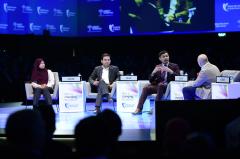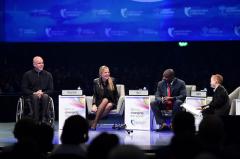7th Annual Global Education & Skills Forum Opens With Emotional Plea By Rohingyas To Support Education Of Refugee Children
The seventh annual Global Education & Skills Forum (GESF 2019), a Varkey Foundation initiative, opened at The Atlantis, The Palm, Dubai, UAE, with an emotional plea by Rohingyas to support the education of refugee children, whose only hope for the future rests on it.
Addressing the audience, Ahmed Ullah, organiser of peace rallies and co-writer of ‘I Am Rohingya’ and Zainab Arkani, who runs the world’s first Rohingya school in Canada, said ensuring the education of the children is the only way forward to rebuild their lives.
Held under the theme of ‘Who is changing the world?’, GESF 2019 brings together more than 2,200 delegates from 144 countries, who will discuss pressing challenges in the education sector – as well as in society – through 124 sessions.
Seven former heads of state and 40 ministers of education are attending the Forum, joined by a new generation of change-makers, including grassroots activists, philanthropists, tech developers and many more, who are shaping the world with new voices, new ideas and new technologies.
The session was opened by 10-year-old Internet sensation, vlogger and presenter Braydon Bent, who set the tone for the day’s events by noting how education and the role of the younger generation has changed along with that of the world’s rapid pace of change. Pointing out the 360-degree wraparound screen in the venue, one of the largest ever used in the Middle East, Braydon said that technologies are advancing at the speed of light, and education had to follow suit or get left behind.
Next to take the stage were Mark Pollock, a visually and physically challenged athlete and explorer and the first blind man to race to the South Pole; Mina Guli, an entrepreneur and adventure committed to global water saving efforts; and Kennedy Odede, a former slum child who is one of Africa’s best-known social entrepreneurs today. The trio spoke about the importance of realistic optimism and the power of the individual in solving collective issues.
Vikas Pota, Chairman of the Varkey Foundation, addressed the global learning crisis in the light of the recent terrorist incidents and natural disasters. With disruption happening in every field, governments need to go down to the grassroots and change the education system and get every child into schools, he noted. “No education system can outperform the quality of its teachers. Improving learning outcomes is the most important thing we will do, and we can only do that by changing teacher status.”
Tariq Al Gurg, CEO of Dubai Cares, spoke about instilling a voice and sense of purpose in students around the world, citing the example of Swedish student Greta Thunberg, whose strike against climate change outside her country’s parliament mobilised thousands globally to follow her actions. With 10 million entering the job market year, education being offered today must change to keep up with evolving jobs and industries. In line with UAE Vision 2021, our education must ensure that the youth have what it takes to be the change, shoulder more responsibility an innovate more.
Underlining the need to promote the status of teachers in society and to put at the heart of the dialogue in education, Sunny Varkey, Founder of the Varkey Foundation and the Global Education & Skills Forum, said that “respecting teachers is not only an important moral duty – it’s essential for positive education outcomes.”
He said: “The status of teachers in society is directly related to the results of students in their classrooms. Today, education is at a crossroads; it has been tossed in the air and we don’t know where the pieces will fall. There is, however, one thing we can be confident about: education will change more in the next fifty years than it has in the last thousand, and in the next fifty years, it will change in ways that will influence the next thousand.”
Highlighting the need to reimagine education, Sunny Varkey said: “New jobs will require creativity, problem-solving, negotiation and emotional intelligence. Giving every child a great education is now an urgent need – and there is not a moment to lose.
“We need a great education that teaches young people how to sift truth from hype, and the difference between a balanced argument and a cynical outburst on social media. We need a great education that teaches young people how seeing the world from another point of view is a strength…. not a weakness and shouting people down is a weakness….not a strength.”
Sunny Varkey said that EdTech has promised much but not yet delivered its great potential – more so because teachers are never invited to be part of the EdTech discussion. “If we get this right, we can give teachers the data that shows where a child needs more help; we can free teachers from the burden of bureaucracy; we can give teachers the chance to learn from each other wherever they are in the world; and we can let teachers get on with the work that no robot will ever be able to do.”
Rohingya speakers Ahmed Ullah and Zainab Arkani, narrated their backstories of struggle and despair. An emotionally charged Ullah, who spent the first 15 years of his life in a camp, before making his way to Canada, recounted his experience of being physically kicked out of school, when he was a child. He said: “We don’t want anything from you – but education for our children; if not, another generation of Rohingyas will be lost.
Arkani experienced systemic discrimination as a student in Myanmar but went on to complete her undergraduate studies and helped rescued stranded Rohingya at the Thailand-Myanmar border. Today, the Canadian citizen continues doing advocacy and community work for her community. She said: “We have enough sympathy, empathy and donations. What we need is education and vocational training for Rohingya children. Help us in our efforts to raise the first educated generation from an illiterate people.”
Asif Saleh, Senior Director – Strategy, Communications & Empowerment, BRAC, the NGO, said Bangladesh opened doors to over 700,000 Rohingya refugees and provided emergency support. “The greatest challenge now is to ensure children have access to education and skills training or risk losing out a large generation of people.” He said that donor fatigue is setting in with only about 40 per cent of the current year’s need of over US$600 million met. “We need to have a mid-term solution – and that is skills building and creating livelihood opportunities to create self-sufficiency.”
GESF 2019 is also hosting the Next Billion Prize, which recognizes leading edtech startups making an impact on education in low income and emerging economies, as well as the first Philanthropy Summit, attended by over 64 grant making foundations from around the world. The climax of the GESF will be the award ceremony of the US $1 million Global Teacher Prize 2019 on Sunday 24th March 2019.
For the first time, Varkey Foundation is also hosting ‘The Assembly: A Global Teacher Prize Concert’ as a joyful ‘thank you’ to teachers all around the world for the unsung work they do every day in the evening on Saturday 23 March.








